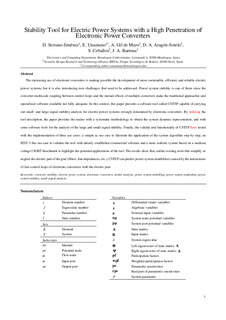
Ver/
Título
Stability tool for electric power systems with a high penetration of electronic power convertersFecha de publicación
2022Grupo de investigación
Sistemas electrónicos de potencia aplicados al control de la energía eléctricaOtras instituciones
TecnaliaVersión
PostprintTipo de documento
ArtículoArtículoIdioma
InglésDerechos
© 2022 Elsevier B.V. All rights reserved.Acceso
Acceso embargadoFin de la fecha de embargo
2024-09-30Versión de la editorial
https://doi.org/10.1016/j.epsr.2022.108115Publicado en
Electric Power Systems Research Vol. 210. N. artículo 108115, 2022Editorial
Elsevier B.V.Palabras clave
Converter stability
electric power system
electronic converters
modal analysis ... [+]
electric power system
electronic converters
modal analysis ... [+]
Converter stability
electric power system
electronic converters
modal analysis
power system modelling
power system simulation
power system stability
small-signal analysis [-]
electric power system
electronic converters
modal analysis
power system modelling
power system simulation
power system stability
small-signal analysis [-]
Resumen
The increasing use of electronic converters is making possible the development of more sustainable, efficient, and reliable electric power systems, but it is also introducing new challenges that need ... [+]
The increasing use of electronic converters is making possible the development of more sustainable, efficient, and reliable electric power systems, but it is also introducing new challenges that need to be addressed. Power system stability is one of them since the converter multiscale coupling between control loops and the mutual effects of multiple converters make the traditional approaches and specialized software available not fully adequate. In this context, this paper presents a software tool called CSTEP capable of carrying out small- and large-signal stability analysis for electric power systems strongly dominated by electronic converters. By utilizing the tool description, the paper provides the reader with a systematic methodology to obtain the system dynamic representation, and with some software tools for the analysis of the large and small-signal stability. Finally, the validity and functionality of CSTEP have been tested with the implementation of three use cases: a simple ac use case to illustrate the application of the system algorithm step by step, an IEEE 5-bus use case to validate the tool with already established commercial software and a more realistic system based on a medium voltage CIGRÉ benchmark to highlight the potential applications of the tool. The results show that, unlike existing tools that simplify or neglect the electric part of the grid (filters, line impedances, etc.), CSTEP can predict power system instabilities caused by the interactions of fast control loops of electronic converters with the electric part. [-]
Sponsorship
Comisión EuropeaID Proyecto
info:eu-repo/grantAgreement/EC/H2020/963527/EU/Interoperable, modular and smart hybrid energy storage system for stationary application/ISTORMYColecciones
- Artículos - Ingeniería [758]
Ítems relacionados
Mostrando ítems relacionados por Título, autor o materia.
-
High Efficiency Converters Based on Modular Partial Power Processing for Fully Electric Maritime Applications
Anzola, Jon; GARAYALDE, ERIK; Urkizu, June; Alacano, Argiñe; Lopez Erauskin, Ramon (MDPI, 2023)This paper proposes an approach for analyzing the benefits that partial-power-processing-based converters can bring to fully electric maritime applications. With the aim of making the system modular and scalable to different ... -
Reactive Power Limits of Single-Phase and Three-Phase DC-Link VSC STATCOMs under Negative-Sequence Voltage and Current
Marzo Elguero, Iosu; Barrena, Jon Andoni; Abad, Gonzalo (IEEE, 2021)This paper analyzes and compares the reactive power limits of single- and three-phase configured dc-link Voltage Source Converter (VSC) structures for Static Synchronous Compensator (STATCOM) to operate with negative-sequence ... -
Wind Turbine Oriented Solutions to Improve Power Quality and Harmonic Compliance of AC Offshore Wind Power Plants
Ruiz Miguel, Carlos; Abad, Gonzalo (IEEE, 2021)The operation of offshore wind power plants with respect to power quality and grid code compliance must be verified for different conditions in the design phase using harmonic analysis methods. This paper addresses this ...




















